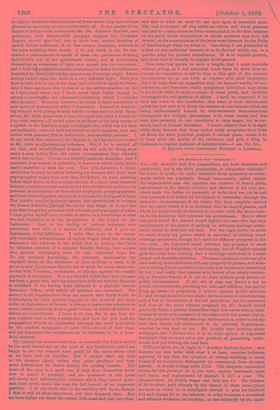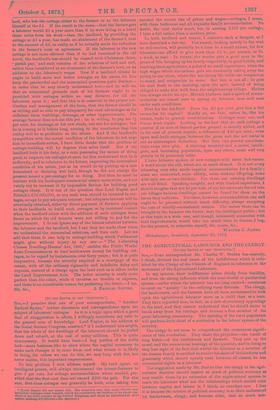iTo ran EDITOR OF TES SPECTATOR:1 Sru,—Mr. Arnold's first five
propositions are both desirable and, practicable, but is the sixth practicable, or altogether desirable ? Its object is good,—to make unlawful those perpetual re-settle- ments which are popularly, though inaccurately, called entails. No unprejudiced man can approve the motives of family pride, subservience to the family solicitor, and distrust of his own son, which leads the father to persuade or bribe that son (as he had been persuaded or bribed by his father) to surrender, through the unknown circumstances of his future life, that complete control' over his estate which it is so desirable that he should possess, and- which he might surely be trusted to exercise with the same inter- est in the family as had actuated his predecessors. But to effect this good object Mr. Arnold would deprive the man who has only real property of the power of making an ordinary marriage settle- ment, unless he first sells his land. For the legal power to settle- an estate is only the power which is exercised in making every marriage settlement, though it is used for different purposes in the two cases. An ingenious social reformer has proposed to meet- this dilemma by forbidding all settlements, but all English opinion. goes the other way, holding that a marriage settlement is a most proper and desirable provision. The same opinion is in favour of a man making that settlement with any property he pleases, and with- out requiring him to convert it into some new investment prescribed by law ; and lastly, that opinion is in favour of an estate continu- ing in the same family, if it can be done without gross private or- public inconvenience. If the wit of man can devise a law to' permit settlements for providing for wife and children, but not for- tying up estates in perpetuity, I believe opinion would sanction. it ; and though Lincoln's Inn might devise a mode of counteracting such a law in the interest of the old prejudices, yet its enactment. and that of the other reforms proposed by Mr. Arnold would gradually foster a greater disposition than now exists among land- owners to trust each possessor of the estate with full power over it. But the proposal to forbid marriage settlements in order to set the free stands self-condemned to the ordinary Englishman,. whether he has land or not. Mr. Arnold says nothing about mortgages, but I believe that it is by sorne system of registered mortgages that we must solve the problem of permitting settle- ments, and yet leaving the land free.
Will you allow me, in reply to "Another Radical Squire," who honours my last letter with what I, at least, consider judicious. approval, to say that the question of cottage-building is much clearer if we completely distinguish its economical from its other aspects. A decent cottage costs 1150. The adequate economical return for this (interest at 4k per cent., repairs, insurance, rates and taxes, and replacement of capital) is 110 a year. The labourer from his weekly wages can only pay U. The balance of 26 is either paid directly by the farmer in those cases (there are such) in which he is intelligent enough to give his landlord 110 and charge /4 to the labourer, in order to secure a contented and efficient workman on his farm ; or else indirectly by the land- lord, who lets the cottage either to the farmer or to the labourer himself at the £4. If the result is the same—that the farmer gets a labourer worth £6 a year more than if he were living in a hovel three miles from his work—then the landlord, by providing the cottage at £4 a year, has made an abatement of the farmer's rent to the amount of 16, as really as if he actually made the reduction in the farmer's lease or agreement. If the labourer in the new cottage is not more efficient than if he had remained in the old hovel, the landlord's loss should be classed with Christmas doles, ' pariah pay,' and such remains of the relations of lord and serf, rather than considered as an abatement of the farmer's rent, or an addition to the labourer's wages. Now if a landlord thinks he ought to build more and better cottages on his estate, let him keep the patriarchal and the economical questions quite distinct— in order that he may clearly understand both—and he will see -that on economical grounds each of his farmers ought to be provided with cottages within an easy distance for all the



































 Previous page
Previous page